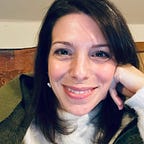We need to feel whole; as if we’re coming from a place of complete connectedness to all the parts of ourselves. I think this is what we’re “waiting for,” those of us who have a sense of waiting.
Why don’t we feel whole? Because of that sister, friend, teacher, parents, kid at the bus stop… the time they said the thing that made us feel a part of ourselves was “unworthy.” Not that we would have thought such a word. We would have thought a word more like “uncool,” or “unaccepted,” or “not ok.” Or maybe something derogatory. When we heard that message, which could have only been a fleeting, wordless look on someone’s face, it was loud and clear. It said, “Don’t show that part of yourself again. Kill it, if you can.”
So we did. Or at least buried it alive, deep within, hoping to drown it to death with a “cooler,” “more accepted” facade of personality traits. It hurt, but it taught us how to get by. And we got by.
But we’re not getting by so well anymore. Though the kid at the bus stop is long gone, we still fear he’ll make us feel as stupid as he did that day. But now he’s our boss. Or spouse. Or neighbor.
We’re not getting by so well because we have so many things buried alive down inside ourselves, and so few genuine parts of ourselves that we let others connect to. It’s a mess.
What we need is to say, “My fifth grade teacher made me feel SO stupid, and I’ve never gotten over it, which also makes me feels stupid. Now I need to feel smart because I need to heal this big part that feels stupid.” Or how about, “This one girl in school always made me feel uncool. Since then I’ve been afraid to let people see the real me, afraid the real me really is uncool. I’ve been hiding myself for so long, I don’t know who I really am, or what I could love if I didn’t fear being uncool.”
Truth be told, we don’t even need to have someone discourage us. It’s enough to have little interests spring up, brand new and undeveloped, only to have no one encourage them at all. Unnourished, they die off. These can be trickier to recover because it’s not a matter of healing anything; it’s a matter of somehow recalling that they ever existed, finding their dead remains, and trying to breathe new life into them.
The others, though. The hurts. The severed connections. The fingers that poke us, telling us which things about ourselves we should not find acceptable…. These have to be healed. If they can be healed, we suspect, we can be whole. If we can be whole, we could find and resuscitate those unnourished others. We could think for ourselves, which would lead to more satisfying decisions and a genuinely happier life. We could be more interested, more creative, more present.
So, where do we begin? Because, we do begin.
We begin by remembering. Remember when we felt less-than because our clothes weren’t new. Remember how that felt, but then remind ourselves that it’s over. And remind ourselves that it never did make us less-than, and it still doesn’t now.
Remember how the fifth grade teacher made us feel stupid, but remind ourselves that it was her job to do the opposite — the failure was on her. Remind ourselves that we’re not stupid after all; we just had a stressful year that year.
We begin by remembering the pain because we can’t heal what we’re hiding. We are, after all, mostly hiding these wounds from ourselves. And no, we do not bring them into remembrance so we can dwell. We don’t dwell. We say, “this is a pain that shaped me and it isn’t even true.” We say, “I want to reshape myself.”
What do we do, then, to reshape ourselves?
We look again at the memory, and give ourselves the care that would have made that situation right. We give it now. Our one cherished toy was broken by a jealous sibling (and we learned to hide and protect forever after). So now we love the hurt child. “You deserved that toy. They deserved one that filled their hearts so they could be happy for you, because you deserve for them to be happy for you. I know you loved it, and I loved it, and I love it still, and I love you.” We say this slowly and mean the words we say. We say it slowly, and take the words in.
Then we sit in this loving of the self. And in the loving, and in the caring of the self, we find healing. There is no giant “F-you” to the teacher or parent or sibling or kid at the bus stop or boss or friend or whoever. It’s not about them. It’s about ourselves. We love ourselves . We heal ourselves. And in doing so, we become whole.
For some, the damages that shaped us were sometimes more violent, more disruptive to mental health. More abusive. For those, the path is likely longer, but similar. It’s important, though, to understand that some events may be unsafe to revisit alone, if at all, and that these things might require the support of a trusted psychologist or psychiatrist. We have to honor this, because when we find ourselves here, it’s the first part of the loving conversation. It’s the part that says to the hurt self inside, “I am going to take care of you. I’ll get the help that we both need and I’ll be with you.”
Meeting our needs and becoming whole is for all of us, no matter the path we take on the journey.
